
[BOOK SEMINAR] Wolfgang Schmale – History of Modern Enlightenment
The Enlightenment of the eighteenth century remains relevant in the twenty-first century. It functions as a humane social compass in a world that has gone off track. Providing such social orientation has always been the main goal of the Enlightenment – even as it has been exposed to fundamental criticism at every turn. The Enlightenment’s potential to guide society in times of crises, wars, and terrorism has developed precisely in the context of such criticism. Wolfgang Schmale traces this historical process from the early nineteenth century, with a special focus on intellectuals from Hegel to Foucault and Jonathan I. Israel. Utilizing the methodology of digital humanities, he analyzes the Enlightenment from a global historical perspective.
Wolfgang Schmale (1956) is a German historian. He was a professor of modern history at the Institute of History at the University of Vienna (Austria). He is a member of the European Academy of Sciences and Arts (Salzburg), the Academia Europaea (London), and the scientific advisory board of the House of European History in Brussels, an institution of the European Parliament. He is well-known for his publications on French history, European history, the history of human rights, and the history of masculinity. He is also an expert in digital humanities. He edited a comprehensive handbook on the history of school education in Europe during the Enlightenment. It was the first handbook to cover all of Europe. Clio has published his books in Serbian: History of the European Idea (2003), History of Masculinity (2011), What Will Happen to the European Union? (2019) and History of Moder Enlightenment (2024).
Participants: Igor Cvejić (IFDT), Đorđe Hristov (IFDT), Ivan Ejub Kostić (IFDT), Predrag Krstić (IFDT), Slobodan Marković (Faculty of Political Sciences, University of Belgrade), Olga Nikolić (IFDT), Dragan Prole (Faculty of Philosophy, University of Novi Sad), Milan Ristović (Faculty of Philosophy, University of Belgrade), Nataša Šmelc (IFDT) and the author.
